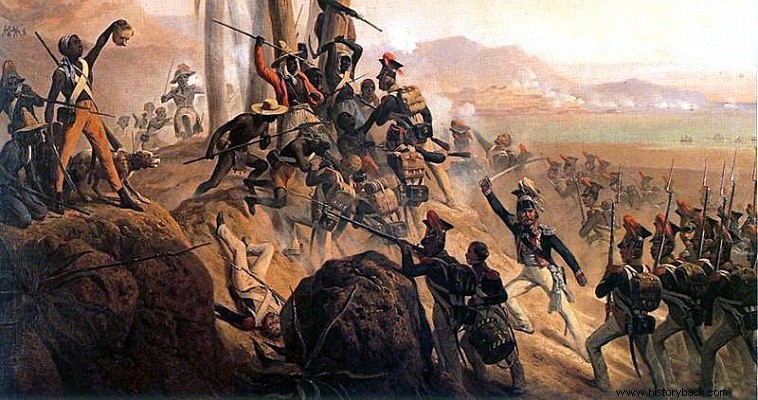
The Battle of Vertier was the catalytic conflict that sealed the freedom of Haitian slave rebels. It was a conflict between the desperate and the force that Napoleon sent to re-enslave them.
Haitian slaves revolted against white plantation owners and their men. Gradually the British and the Spanish became involved in the conflict. But Napoleon decided to crush the former slaves and restore the slave regime.
He sent strong forces to the island, under General Leclerc, who treacherously captured the leader of the revolutionaries, Toussaint Louvertier, whom he sent in irons to France to die there of ill-treatment , a few months later.
General Leclerc, died of disease, ordering, before he died, the killing of all blacks in the area of Le Cap. His successor, Rosambeau, launched an even harsher campaign against the black rebels, bringing to the island 15,000 dogs trained to track blacks, while drowning many at sea.
The revolutionaries, now under Jean-Jacques Dessalines, responded accordingly, burning alive, sawing or axing, piece by piece, French prisoners. In this climate the battle of Vertier was the catalytic conflict.
Battle without mercy
Dessalines had managed to gather several thousand rebels and occupy 2/3 of the island. In November 1803 Rosambeau was with 5,000 men at Le Cap (known as Cap Française or Cap Haitien).
Dessalines, on the other hand, managed to marshal 27,000 men. These men were armed with whatever weapon was available. But there were also regular divisions armed and trained like the French. The rebels also had few guns.
On the night of November 17-18, 1803, they attacked the Vertier fort led by François Capois. As the French camp was given the alarm Capois led his "semi-brigade" (the French democrats' term for an infantry regiment) against them despite the fire.
The French guns of the fortress of Vertier also opened fire, inflicting heavy casualties on the attackers. However, the Haitians thickened their lines and bravely continued the advance. Capua's horse was killed but he got up and with sword in hand led his men shouting "advance, advance".
At the same time Rosambeau was watching the progress of the battle from the ramparts of Vertier. Suddenly a French officer galloped towards the Haitians, stood in front of them and shouted:"General Rosambeau salutes the general who is glorified in this way," meaning Capois.
The battle ceased for a few moments. As soon as the Frenchman moved away, after giving a military salute to the Haitians, the shots thundered again. In the meantime Rosambeau threw his grenadiers into battle. But the Haitians fought fanatically and repelled the last French desperate attempt.
After that, Rosambeau, taking advantage of the storm that broke out, managed to retreat, admitting his defeat. Casualties on both sides were roughly equal – 1,200 men on each side. But the Haitians were more.
On the morning of November 18, Rosambeau sent his officer to negotiate with the victors. Eventually the surviving French were given 10 days to leave the island. The French wounded were left behind and all died. A few weeks later, on January 1, 1804, Dessalines declared the independence of Haiti.
